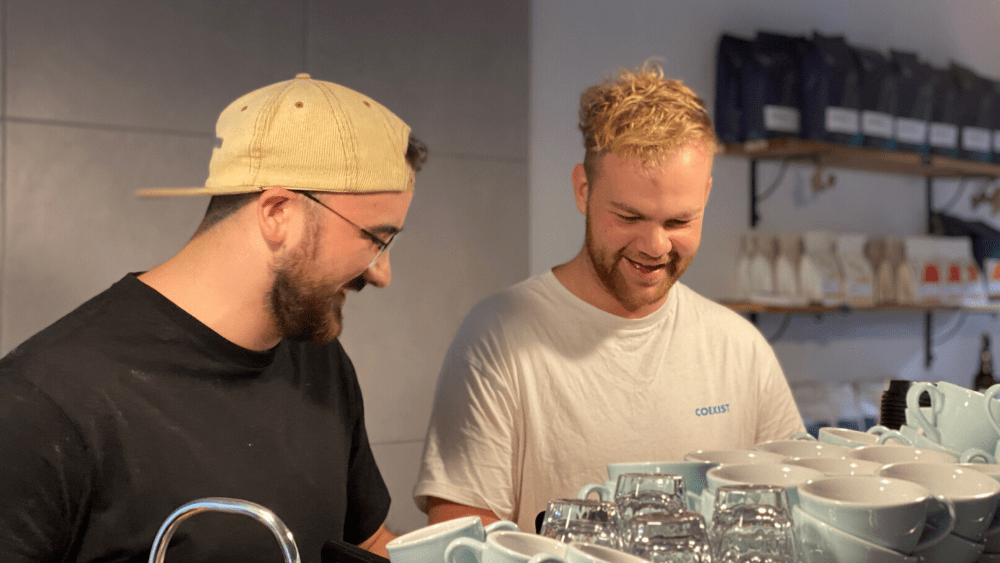Jake Burn and Rowan Van Heeswijk are already feeling the effects of COVID-19. As co-owners of a small café in Sydney’s northwest, they are among three-quarters of Australians in the food services and accommodation industries who reported losses over March due to the pandemic.
And like almost everyone in food services, Burn (21) and Van Heeswijk (22) are bracing themselves for the full impact of the COVID crisis. The biggest blow will come from the ban on sit-down dining, which came into place on March 23 as a measure to stop the disease spreading.
“Our revenue is down about 40 per cent.” – Jake Burn
“We used to have about 130 sales on a weekday – either from group of peoples or individuals,” Burn explains from their year-old Harvest café in Beecroft. “Right now we’re averaging around 100 [sales], but our revenue is down about 40 per cent because most of those sales are just coffees, and we make most of our revenue on food.
“Yesterday, not even factoring in staffing, we lost money on food because the amount we had to chuck out was greater than how much we sold.”
The only way that the café will be able to stay afloat is through the government’s COVID-19 stimulus payment of around $20,000 for small businesses.
“This means, at the very least, that we can pay rent for the next six months,” says Burn, adding that they are considering implementing other contingency plans in coming days.
“We are probably going [to] decrease our working hours – and close at 12 noon instead of 3pm. The second thing is we might have to stop food completely, just to cut down on wastage based on the numbers that we’re currently doing.”
“The last thing we want to do is lay-off staff … our first move would be to shorten our hours and fire ourselves.” – Jake Burn
He continues: “Because we have a faith and our moral outlook is from a Christian perspective, Rowan and I are extremely concerned about our staff. The last thing we want to do is lay-off staff. Rather than firing our staff and working ourselves, our first move would be to shorten our hours and fire ourselves.”
Burn notes that here their young age plays to their advantage, as he and Van Heeswijk still live at home so have a family to fall back on, if needed. He also notes that, compared to larger businesses, they are “pretty lucky” that they only have five staff to worry about, so the government payout will actually make a big difference to their ability to keep their staff employed.
But even if the business manages to stay afloat, there is still a sense of grief about the changed nature of their beloved café.
“We’ve got probably the greatest customer base ever. People are being so kind and generous in still coming to buy takeaway coffees just to keep us afloat.
“But it’s lost its soul almost. What I love about Harvest is that people come to hang out and do life together, but now it’s just an empty shop.”
This community at Harvest cafe is also greatly missed by one of its regulars, Graham Rees, who often sits for hours in the café, eating and drinking coffee while he does university study. “When I first walked in there, I was immediately struck by how chilled and calm and completely lacking in guile and pretence the café was; even before I ate or drank anything, I just warmed to the atmosphere of authenticity that defines the place,” says Rees.
“My heart breaks, not just for Harvest but for the thousands of businesses in this country – and, of course, millions of businesses all around the world … Obviously, I miss the guys and I miss the coffee and I miss the food, but it feels selfish of me to be concerned about what I’m going to be missing out on because I know that other people are going to be having it really tough.”
“It’s hard not to react negatively. But the assurance is that we have a God who is in control.” – Rowan Van Heeswijk
Van Heeswijk, who has worked hard with Burn to create a culture in the café where “it’s not weird to see a Bible being opened”, shares that his Christian faith is helping him to come to terms with the rapid changes affecting his business, finances and life.
“At the moment, we’re just at the watch and act stage … Everyone’s still holding their head high and taking it as it comes. We’re trying to keep that attitude and just roll with it and trust.
“When you lose aspects of control – like your health and your social life and your business – it can be stressful to see all those things slipping away, and it’s hard not to react negatively. But the assurance is that we have a God who is in control – he’s a good God and a just God and he loves us and looks out for us.
“We know that doesn’t necessarily mean that what we feel is best for us is going to happen, but in the end, it’s about trusting in him and his will.”
Email This Story
Why not send this to a friend?

